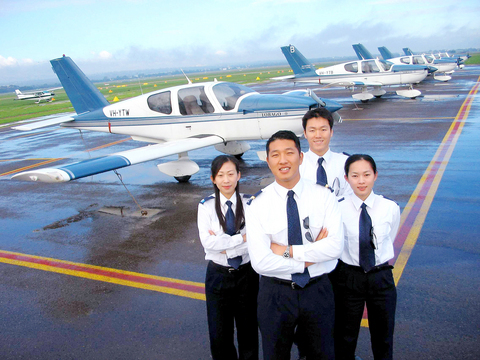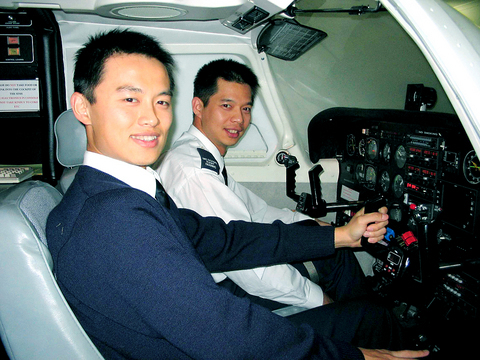Sitting in front of a desk, Lucas Tu (杜冠勳), a cadet of China Airlines (華航) in a flight training school in Adelaide, Australia, is sifting through piles of books and navigation maps on a normal Thursday evening, when most people are relaxing after work.
While studying, he looks up at a photocopy of a dashboard and an instrument panel that's pasted on the wall, and goes through the flying procedure in his brain as if he were on the aircraft. Tu has been leading this kind of tense life for 12 hours a day, for nearly six months. This might be what his life will be like until the day he retires.
"The training courses here are tough, but I was all prepared before I came," Tu said. "I know the life of a pilot is not as glamourous as some people may imagine."

PHOTO: JESSIE HO
Like Tu, another 57 cadets of China Airlines -- Taiwan's largest carrier -- choose to live a stressful life in order to accomplish their dreams of flying. They also realize they will be shouldering responsibility for flight safety in the future.
China Airlines started to recruit and train pilots in 1989, as pilot resources from the air force -- a main source for the airlines at the time -- were decreasing. The first batch of company-trained pilots graduated from a flight training center at the University of North Dakota in the US in 1991. Now, those graduates are performing their duties and taking on key positions within China Airlines.
"It takes 10 years and a total of NT$10 million (US$313,000) to nurture a full-blown pilot," said Roger Han (韓梁中), director of China Airlines' finance division. "But this investment is a must for us."

PHOTO: JESSIE HO
In 1995, company-trained pilots made up only a single-digit percent of China Airlines' pilot crew, while retirees of the ROC Air Force accounted for 80 percent. After years of personnel restructuring, company-trained pilots now make up one-third of China Airlines' 1,000-strong pilot crew.
"We've found that the introduction of more company-trained pilots has injected a new energy into our flight operations and contributed to improving flight safety," said Thomas Chang (張達明), assistant manager of China Airlines' crew resource management (CRM) training section.
Often, pilots who have retired from the air force make decisions based on many years of flying experience, Chang said. company-trained pilots are taught to strictly follow "SOP" -- standard operating procedure -- which was introduced by consultants from Lufthansa Technik AG, a subsidiary of Lufthansa German Airlines, in order to overhaul China Airlines' flight security measures in 1997 and 1999, Chang added.
The training program in 2000 was shifted to a well-known civil pilot training school in Adelaide, Australia, called British Aerospace (BAE) Systems, now named Flight Training Adelaide (FTA) after being purchased by Young Brothers Aviation last month. FTA is also the institution where major airlines such as Australia's Qantas Airways Ltd and the Dubai-based Emirates Airlines enroll their cadets.
In FTA, China Airlines cadets need to complete a 48-week training course, which contains 600 hours of groundwork education, including meteorology, aerodynamics, aviation law, navigation, and others, and requires 300 flight hours. China Airlines pumped in NT$6 million for each cadet for the training program, and therefore sets high standards for them, Chang said. Students who fail to pass one of the required modules are sent home immediately, Chang said.
"For me and for most cadets, the first challenge of the training is solo flying," Tu said. "But after overcoming psychological obstacles, flying is just like riding a bike."
Recalling his first trip in the air, Tu said he felt very sick and even vomited. The same situation lasted for the next two flights.
"I still carry air sickness bags with me now, just in case," Tu said and laughed.
Tu is 27 and a business administration graduate from National Taiwan University, and previously worked as an electronics dealer.
aviation training
Tu's fellow cadets hail from a wide variety of fields, such as construction, art, public relations, banking, electronics and sales, indicating they are "in the same boat" when it comes to aviation training.
But the would-be China Air pilots said the computer cannot handle any unexpected incidents.
"I think the defining characteristics for a pilot to have are a strong will and an agile personality that can handle all kind of contingencies," said Mike Cheng (鄭俊傑), another China Airlines cadet.
There's a joke in the aviation industry that says the role of the pilot has been shrinking over the past two decades, as computers have gradually taken over their responsibilities. The joke says that in future, high-tech cockpits will be equipped with a computer, a pilot and a dog. The computer will fly the plane, the pilot will be watching the computer and assure the passengers that the plane is guided by a man not a computer. And the dog? It will bite the pilot if he or she dares to touch the control gears.
The most difficult part of the course is considered to be "multi-task flying," during which all sorts of scenarios are simulated -- from storms and turbulence to a passenger having a heart attack -- ? in order to test the cadet's ability to tackle an emergency while keeping the flight safe and sound, Cheng said.
Another tough part of the training is "night flying" or "instrument flying," in which cadets have no check points as reference but can only fly by instruments, Cheng said.
As calmness, patience and deliberation are the main prerequisites for pilots rather than mechanical ability, the job is perfectly suited for women, said Stacy Yang (楊雅如), one of the eight female cadets.
Before joining China Airlines, Yang worked as an administration director at the Taiwan High Speed Railway Corp (台灣高鐵), the contractor of the nation's first bullet train linking Taipei and Kaohsiung, slated to begin operating this October. But Yang chose to shift her career after getting the recruitment notice in April of last year.
"It took me a few days to convince my family to support my decision as they didn't think this was the right job for a girl," Yang said.
After months of training, Yang said that like men, women can handle the tasks well, and sometimes even better. She also works out at a gym to strengthen her physical condition.
Yet with all different aspects of the training, one concept is never changed: SOP.
"We are taught to always follow SOP, and even get awards for challenging captains if they fail to follow procedure, which I think, greatly enhances flight safety," said Frank Wu (吳明遠), a China Airlines cadet.
With the number of company-trained pilots having gradually increased in China Airlines, along with stricter safety procedures, all pilots, regardless of whether they are from the air force, a CAL training program or a foreign one, are flying by SOP, Chang said.
company culture
The old authority of "the captain" no longer exists, as captains are co-pilots and sort out disputes using SOP, which is a big change in the company's culture, he added.
After getting through the training course in Adelaide, cadets still have a long journey before embarking on the career of a pilot. They need to go through two years of training on large commercial jets to become co-pilots, or a first officer, to carry out their flying duties. And it takes another eight years for first officers to become captains.
"I think I can do it if I work hard," Yang said, "I don't worry about China Airlines' past flight record because I have seen the resources and effort they put in to regain their reputation."
"As cadets of China Airlines, I think we should not stumble from the burden of responsibility? instead, it is now our job to carry it," Yang said.

Meta Platforms Inc offered US$100 million bonuses to OpenAI employees in an unsuccessful bid to poach the ChatGPT maker’s talent and strengthen its own generative artificial intelligence (AI) teams, OpenAI CEO Sam Altman has said. Facebook’s parent company — a competitor of OpenAI — also offered “giant” annual salaries exceeding US$100 million to OpenAI staffers, Altman said in an interview on the Uncapped with Jack Altman podcast released on Tuesday. “It is crazy,” Sam Altman told his brother Jack in the interview. “I’m really happy that at least so far none of our best people have decided to take them

BYPASSING CHINA TARIFFS: In the first five months of this year, Foxconn sent US$4.4bn of iPhones to the US from India, compared with US$3.7bn in the whole of last year Nearly all the iPhones exported by Foxconn Technology Group (富士康科技集團) from India went to the US between March and last month, customs data showed, far above last year’s average of 50 percent and a clear sign of Apple Inc’s efforts to bypass high US tariffs imposed on China. The numbers, being reported by Reuters for the first time, show that Apple has realigned its India exports to almost exclusively serve the US market, when previously the devices were more widely distributed to nations including the Netherlands and the Czech Republic. During March to last month, Foxconn, known as Hon Hai Precision Industry

PLANS: MSI is also planning to upgrade its service center in the Netherlands Micro-Star International Co (MSI, 微星) yesterday said it plans to set up a server assembly line at its Poland service center this year at the earliest. The computer and peripherals manufacturer expects that the new server assembly line would shorten transportation times in shipments to European countries, a company spokesperson told the Taipei Times by telephone. MSI manufactures motherboards, graphics cards, notebook computers, servers, optical storage devices and communication devices. The company operates plants in Taiwan and China, and runs a global network of service centers. The company is also considering upgrading its service center in the Netherlands into a

Taiwan’s property market is entering a freeze, with mortgage activity across the nation’s six largest cities plummeting in the first quarter, H&B Realty Co (住商不動產) said yesterday, citing mounting pressure on housing demand amid tighter lending rules and regulatory curbs. Mortgage applications in Taipei, New Taipei City, Taoyuan, Taichung, Tainan and Kaohsiung totaled 28,078 from January to March, a sharp 36.3 percent decline from 44,082 in the same period last year, the nation’s largest real-estate brokerage by franchise said, citing data from the Joint Credit Information Center (JCIC, 聯徵中心). “The simultaneous decline across all six cities reflects just how drastically the market